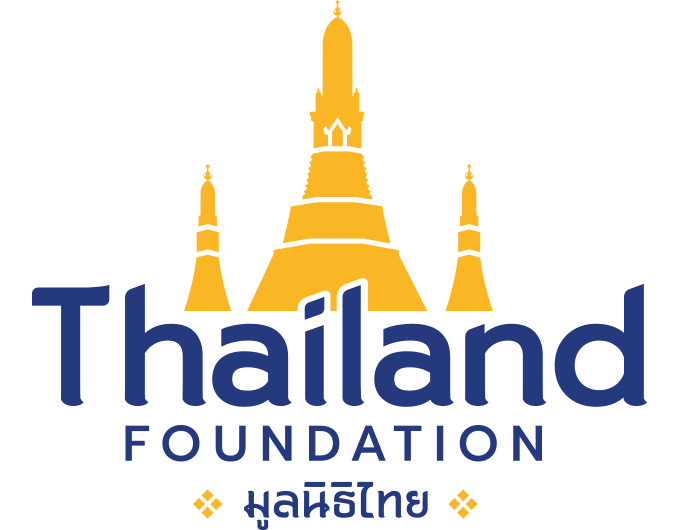***Also available in Thai***
World Health Day is an annual event that the United Nations encourages its member countries worldwide to observe to draw attention to global health. After its founding on April 7, 1948, the World Health Organization (WHO) designated April 7, 1950, as the first World Health Day. Now, 193 countries are WHO members, as the organization leads the global celebration on April 7 annually.
 World Health Organization (photo credit: https://bit.ly/3wGXNAz)
World Health Organization (photo credit: https://bit.ly/3wGXNAz)
Buddhism, established by the Gautama Buddha or Buddha in the sixth century BCE, has some useful advice on health, especially mental and psychological.
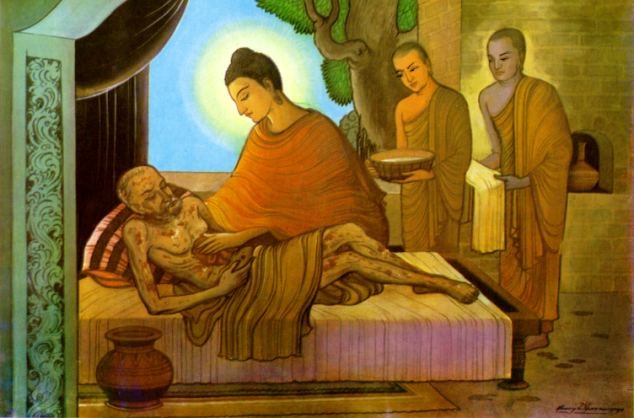
The Buddha serves a sick monk. (Photo credit: https://bit.ly/3qGlbu2)
The word “health” has at least two important meanings, according to the Oxford Advanced Learner’s Dictionary. One is the condition of a person’s body and mind, as in this sentence: “Here are some simple ways to improve your health and fitness.” The other is the state of being physically and mentally healthy, such as in these sentences: “Rest and exercise restored her health,” “She was glowing with health and enjoying life,” and “As long as you have your health, nothing else matters.”
To achieve a healthy life, one needs physical and mental activities, which may include eating healthy food, drinking plenty of water, having a balanced diet, maintaining good hygiene habits, getting regular exercise, preventing substance abuse, maintaining a healthy weight, having proper housing, getting enough sleep, making good lifestyle choices, being optimistic, managing stress, and so on.
Although the Buddha also gave much importance to physical health, I will not discuss it here. I would rather talk about mental health, which he emphasized much more.
Mental health is defined by WHO as the state of well-being where every individual realizes his or her own potential, manages the normal stresses of life, works productively and fruitfully, and can contribute to his or her community. The Buddha’s advice helps one realize this.
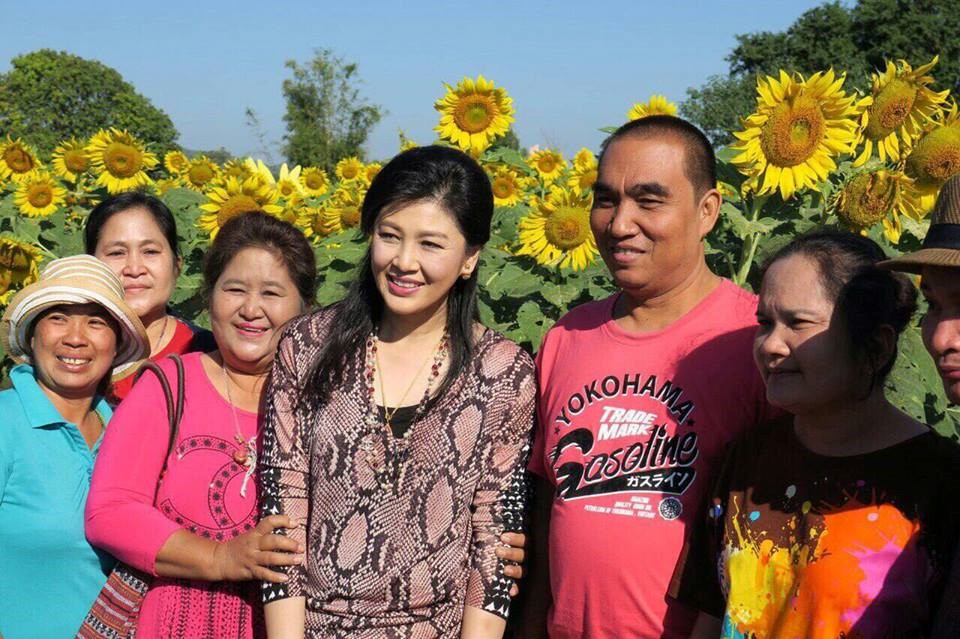 Smiling Thai people (photo credit: https://bit.ly/3iAOLNk)
Smiling Thai people (photo credit: https://bit.ly/3iAOLNk)
The Buddha is quoted by P. A. Payutto, Thailand’s most famous scholar Buddhist monk, to have shared many verses on developing mental health. For example, he said:
“Grief neither brings back what is past and gone, nor brings forth happiness yet to come.”
“Do not dwell on the past or hanker for the future. Live in the present moment.”
“A man should cling to his hope; a wise man should not be discouraged; I have realized this for myself – whatever I desire I obtain.”
“A wise man, even when confronted with misery, never gives up the hope to find happiness.”
“Taming the mind to be effective is good.”
“A tamed mind brings happiness.”
Taming the mind here means meditation or mental concentration.

Smiling driver with words of welcome on his taxi in Thailand (photo credit: https://bit.ly/3iFAOxA)
- A. Payutto elaborates on the Buddha’s points in his book Buddhadhamma (read more on pp. 1780 – 1783 here) that meditation reduces stress, anxiety, and depression. It also brings about happiness, joy, mental relaxation, inner peace, tranquility, discernment, inner strength, resilience, vigor, cool-headedness, loving-kindness, and compassion, while also relaxing the body. P. A. Payutto mentions in the same book that meditation promotes physical health and aids in curing illness. The mind and body are interdependent and have a bearing on one another. When ordinary people have a physical illness, their mind, too, tends to become weak and depressed; and when a person is discouraged, the illness often worsens. Even when the body is healthy, if people encounter an intensely upsetting situation, they may fall ill. On the other hand, when individuals whose minds are strong have a physical illness, only the body is unwell; the mind remains at ease. Moreover, such persons can use this strong and contented mind to alleviate the healing process. They can also use the power of concentration to reduce physical pain.
Modern scientific studies agree that there is a relationship between mental and physical health. For example, it has been discovered that depression doesn’t just impact mood and motivation. It can directly affect the immune system by suppressing T-cell responses to viruses and bacteria, making it easier to get sick and stay sick for longer. A weakened immune system can lead to a jump in the severity of allergies or asthma. A weakened immune system may cause depression. Stress — especially the chronic type — triggers an immune response within the brain itself.
To strengthen the mind to be able to withstand negative feelings and to boost feeling positive, the Buddha recommended meditation, which is to the mind what aerobic exercise is to the body. Like exercise, there are many good ways to meditate, and you can find a meditation style that suits you best. A 10-minute meditation session alone may help reduce anxiety, and a 20-minute meditation can reduce anger.

(Photo credit: https://bit.ly/3tEjzmC)
How to Meditate
Find a good spot. Location can influence your ability to meditate properly. Above all, choose a place where you feel comfortable. The less distracting and quieter the location is, the better.
You may sit in a chair or bed or on the ground, but sitting with your legs crossed and your back straight is best. Buddhists believe that erect posture strengthens the connection between mind and body. Relax while maintaining good posture. Then close your eyes and accept all sensations as they filter through you. Don’t judge them, but rather, focus on your breathing. If you get distracted, gently guide yourself back to the sound and rhythm of your own breathing. The aim is to achieve active and focused moment-by-moment awareness of your present experience. (Read more here.)
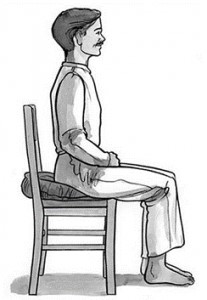
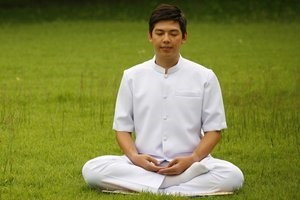
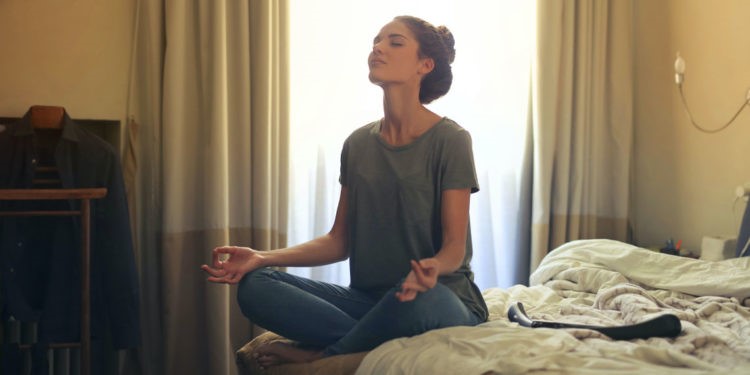
(Photo credit: https://bit.ly/3NjHL5H)
How Often and How Long One Should Meditate
Ideally, meditation should be practiced daily. The duration, however, varies, depending on the source studying the effects of meditation. Some sources recommend at least ten minutes each day, while saying that a half an hour each day would be closer to ideal. Some sources recommend that beginners start with five minutes of meditation per day; then, as the mind gets used to the practice, they could increase the time span by a minute or two each day, aiming for a 15-minute practice after a week.
Some sources, such as Mindfulness in Plain English by Bhante Gunaratana, advise beginners to start with twenty to thirty minutes in their first sessions and gradually extend to an hour after a year. Others, such as Madhuleena Roy Chowdhury, writing in Positive Psychology, suggest that even two minutes per day can be enough for somebody just starting.
Longer sessions appear to increase the benefits of meditation. Research shows that a session of 27 minutes of Mindfulness Meditation may lead to structural changes in key areas of the brain, such as in the hippocampus, the posterior cingulate cortex, the temporo-parietal junction, and the cerebellum, which are involved in learning and memory, emotion regulation, the sense of self, and perspective-taking.

(Photo credit: https://bit.ly/3DmgU4i)
Where to Study Buddhism and Meditation in Thailand
Nowadays one can practice meditation almost everywhere in the world using readily available resources, even YouTube. However, even better, one might argue, are practices in Thailand, where there are many temples and meditation centers offering the study of Buddhism and meditation at the same time. Over a hundred temples offer such experiences. Forest monasteries often provide free meditation lessons, including free room and board. However, not many temples provide instruction in both Thai and English. The list below shows where it may be possible to study both Buddhism and meditation in English:
- Wat Mahathat (Section 5, วัดมหาธาตุยุวราชรังสฤษฎิ์ คณะ 5), in Bangkok. Tel.: 02-2226011, http://www.watmahathat.com/vipassana-meditation/ (The website is a Thai/English bilingual.)
- Wat Phra Dhammakaya (วัดพระธรรมกาย), in Pathum Thani Province, north of Bangkok, https://en.dhammakaya.net/ (The website is in English.)
- Wat Phra Dhatu Sri Chomtong Voravihara (วัดพระธาตุศรีจอมทองวรวิหาร), in Chiang Mai Province, tel.: 053-342186, https://www.watchomtong.com (The website is in Thai only.)
- Wat Phra That Doi Suthep (วัดพระธาตุดอยสุเทพราชวรวิหาร), in Chiang Mai Province, tel.: 053-295912.
- Wat Bhaddanta Asabharam (วัดภัททันตะอาสภาราม), in Chon Buri Province, tel.: 086-8198358, https://www.watbhaddanta.com/ (The website is in Thai only).
- Wat Umong (วัดอุโมงค์ สวนพุทธธรรม), in Chiang Mai Province, tel.: 085 033 3809. Email: umongmedcenter@yahoo.com.
- Wat Pah Nanachat (International Forest Monastery วัดป่านานาชาติ), in Ubon Rachathani Province, https://bit.ly/3perzqx (The website is in English). (Photo credit: https://bit.ly/3fZr8MO)
- Wat Pha Tam Wua (วัดป่าถ้ำวัว), in Mae Hong Son Province, tel.: 081 031 3326 https://www.wattamwua.com/contact/
- The Young Buddhists Association of Thailand (YBAT) – Under Royal Patronage, Bangkok, tel.: 0 2455 2525. Website: www.ybat.org/eng/
- Wat Nong Pah Pong in Ubon Ratchathani Province, which was established by the late Venerable Ajahn Chah Subhaddo in 1954, tel. 0 4532 2729, http://watnongpahpong.org/indexe.php
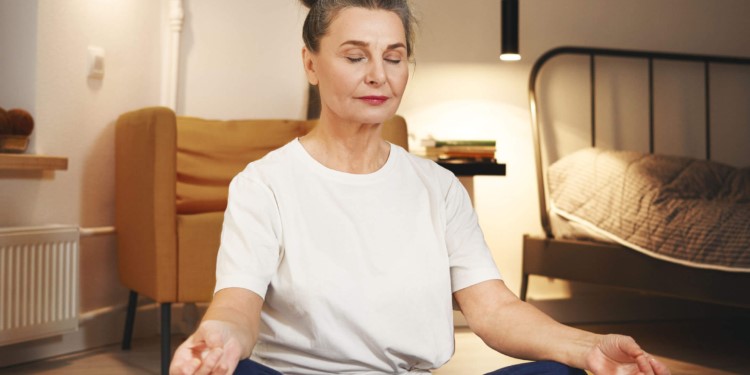
A woman practicing mindfulness meditation (photo credit: https://bit.ly/36P45TD)
I wish for good physical and mental health for you. May you be able to have equanimity through experiences of gain and loss, popularity and unpopularity, blame and praise, and happiness and suffering. Practice patience and endure the onslaughts of worldly vicissitudes by way of meditation so that the vicissitudes are managed and gradually eradicated. Good and bad go together. Understanding this, you are sure to be happier and better able to realize your own potential, work productively and fruitfully, and contribute to your community, whether or not it is World Health Day.
Major references
- Mahtab Alam Quddusi. Importance of Good Health in Our Life – How can We Achieve Good Health and Well Being? at https://bit.ly/3tDEsyj
- P. A. Payutto. The Nectar of Truth, A Selection of Buddhist Aphorisms at https://bit.ly/3ILzELw
- P. A. Payutto. Buddhadhamma: The Law of Natures and Their Benefits to Life at https://bit.ly/3DaxILv
Author: Paitoon Songkaeo, Ph.D.
6 April 2022[:th]
***บทความนี้มีให้อ่านแบบภาษาอังกฤษ***
วันสุขภาพโลกคือวันที่องค์การสหประชาชาติ (ยูเอ็น) พยายามส่งเสริมให้ประเทศสมาชิกยูเอ็นทั่วโลกทำกิจกรรมอย่างใดอย่างหนึ่งด้านสุขภาพเพื่อร่วมกันทำให้ชาวโลกเรามีพลานามัยดีขึ้น องค์การอนามัยโลก (WHO) ที่เป็นองค์กรย่อยของยูเอ็นซึ่งก่อตั้งเมื่อวันที่ 7 เมษายน พ.ศ. 2491 ได้กำหนดให้วันที่ 7 เมษายนของทุกปีเป็นวันสุขภาพโลกตั้งแต่ พ.ศ. 2593 เป็นต้นมา ขณะนี้ทุกปีทั่วโลกประเทศที่เป็นสมาชิกของ WHO จำนวน 193 ประเทศต่างก็ฉลองวันสุขภาพโลกกัน
 สำนักงานใหญ่ขององค์การอนามัยโลก (ภาพจาก https://bit.ly/3wGXNAz)
สำนักงานใหญ่ขององค์การอนามัยโลก (ภาพจาก https://bit.ly/3wGXNAz)
พระพุทธเจ้าผู้ก่อตั้งพระพุทธศาสนาเมื่อประมาณ 2600 ปีมาแล้วก็มีคำสอนเกี่ยวกับเรื่องสุขภาพด้วย โดยเฉพาะอย่างยิ่งสุขภาพจิต

พระพุทธเจ้ากำลังทรงพยาบาลภิกษุอาพาธ (ภาพจาก https://bit.ly/3qGlbu2)
พจนานุกรม Oxford Advanced Learner’s Dictionary ได้ให้คำจำกัดความของคำว่าสุขภาพไว้หลายความหมาย แต่ขอกล่าวถึงเพียงสองความหมาย คือ สภาพของร่างกายและจิตใจเช่นในประโยคว่า “นี้คือวิธีง่าย ๆ สำหรับทำให้ร่างกายสมบูรณ์แข็งแรง” ส่วนอีกความหมายหนึ่งคือมีสุขภาพกายและสุขภาพจิตดี เช่น ในสามประโยคนี้ว่า “การพักผ่อนนอนหลับและการออกกำลังกายจะฟื้นฟูให้สุขภาพกลับมาดีได้” “ดูท่าทางเธอมีสุขภาพดีมากและมีความพึงพอใจกับชีวิตมาก” และ “เมื่อสุขภาพของคุณดี ก็ไม่มีอะไรจะดีไปกว่านี้อีกแล้ว”
เพื่อที่จะได้มีสุขภาพดีคนเราต้องออกกำลังกายและฝึกฝนจิตควบคู่กันไป เช่น รับประทานอาหารสุขภาพ ดื่มน้ำให้เพียงพอ รับประทานอาหารให้ถูกส่วน ใช้ชีวิตอย่างถูกสุขลักษณะ ออกกำลังกายอย่างสม่ำเสมอ ไม่เสพสิ่งเสพติดต่าง ๆ รักษาน้ำหนักตัวให้พอเหมาะพอดี อยู่ในบ้านเรือนที่ดี นอนหลับอย่างเพียงพอ เลือกใช้ชีวิตอย่างถูกต้องเหมาะสม มองโลกในแง่ดี รู้จักจัดการกับความรู้สึกเครียดกังวลต่าง ๆ ได้ดี เป็นต้น
แม้ว่าพระพุทธเจ้าจะทรงให้ความสำคัญกับเรื่องสุขภาพกายด้วยมากเช่นกัน แต่ในบทความนี้ผู้เขียนจะไม่พูดถึงเรื่องนี้ จะขอกล่าวถึงเฉพาะสุขภาพจิตที่พระพุทธองค์ทรงให้ความสำคัญมากกว่าเท่านั้น
องค์การอนามัยโลกได้ให้คำจำกัดความคำว่า “สุขภาพจิต” ไว้ว่า คือสภาพที่แต่ละบุคคลสามารถเข้าใจได้ถึงศักยภาพของตน สามารถจัดการกับความเครียดระดับปกติในชีวิตได้ สามารถทำงานได้อย่างสร้างสรรค์และก่อให้เกิดผลดี และสามารถทำงานให้เป็นประโยชน์ต่อชุมชนของตนได้
 คนไทยยิ้มอย่างมีความสุข (ภาพจาก https://bit.ly/3iAOLNk)
คนไทยยิ้มอย่างมีความสุข (ภาพจาก https://bit.ly/3iAOLNk)
พระพุทธเจ้าเองก็ทรงมีคำแนะนำให้คนเราปฏิบัติตามเพื่อให้มีสุขภาพจิตดี
สมเด็จพระพุทธโฆษาจารย์ (ป.อ. ปยุตฺโต) ได้กล่าวถึงพระพุทธพจน์เกี่ยวกับสุขภาพจิตดีไว้มากมาย เช่นว่า
“ความโศกนำสิ่งล่วงแล้วคืนมาไม่ได้ และความโศกไม่อาจนำมาซึ่งความสุขในอนาคตได้”
“อย่ารำพึงถึงความหลัง อย่ามัวหวังถึงอนาคต (ต้องอยู่กับปัจจุบัน)”
“เป็นคนควรหวังเรื่อยไป บัณฑิตไม่ควรท้อแท้ เราเห็นประจักษ์มากับตนเอง เราปรารถนาสิ่งใด ก็ได้สมตามนั้น”
“คนมีปัญญา ถึงเผชิญอยู่กับความทุกข์ ก็ย่อมไม่สิ้นหวังที่จะได้ประสบความสุข”
“การฝึกจิต ให้เกิดผล ดี” (หมายความว่าการฝึกจิตจนจิตสามารถทำงานได้ดี เป็นเรื่องดี)
“จิตที่ฝึกดีแล้ว นำสุขมาให้”
คำว่าการฝึกจิตในที่นี้หมายถึงการทำสมาธิ

คนขับแท็กซี่ยิ้มแย้มแจ่มใสในประเทศไทย (ภาพจาก https://bit.ly/3iFAOxA)
สมเด็จพระพุทธโฆษาจารย์ (ป.อ. ปยุตฺโต) ยังได้อธิบายขยายความพระพุทธพจน์เกี่ยวกับประโยชน์ของสมาธิไว้ในหนังสือ “พุทธธรรม” ว่ามีมากมายหลายประการ เช่น ลดความเครียด ความวิตกกังวล ความเศร้าโศกสะเทือนใจ การทำสมาธิจะทำให้มีความสุข ความเบิกบานใจ จิตใจผ่อนคลาย การตัดสินใจดี ใจสงบร่มเย็น จิตใจหนักแน่น เยือกเย็น มั่นคง รู้จักยืดหยุ่น มีเมตตาและกรุณามาก และร่างกายก็รู้สึกผ่อนคลายและมีความกระฉับกระเฉง ท่านเจ้าประคุณสมเด็จฯ ยังได้เขียนไว้ในหนังสือดังกล่าวต่อไปด้วยว่าการทำสมาธิทำให้สุขภาพกายดีและช่วยรักษาอาการเจ็บป่วยได้ด้วย เพราะร่างกายและจิตใจเกี่ยวเนื่องกันและพึ่งพาอาศัยกันและกัน ตามปกติของคนทั่วไปเมื่อร่างกายไม่สบาย จิตใจก็พลอยรู้สึกห่อเหี่ยวไปด้วย ยิ่งเมื่อรู้สึกย่อท้อ อาการเจ็บป่วยก็ยิ่งรุนแรง และแม้แต่เมื่อร่างกายแข็งแรง แต่ถ้าต้องเผชิญกับเรื่องเลวร้ายมาก ๆ คนเราก็ล้มป่วยได้เหมือนกัน และในทางตรงกันข้ามคนที่จิตใจเข้มแข็งแม้จะล้มป่วย ร่างกายเท่านั้นที่ล้มป่วย จิตใจยังคงสบาย ซึ่งจิตใจลักษณะนี้จะช่วยลดอาการเจ็บป่วยและช่วยให้หายเจ็บป่วยได้เร็วขึ้น รวมถึงจิตใจที่เป็นสมาธิจะมีพลังช่วยให้ลดความเจ็บปวดได้
การวิจัยทางวิทยาศาสตร์ในปัจจุบันก็เห็นพ้องกับคำกล่าวของสมเด็จพระพุทธโฆษาจารย์ดังกล่าวข้างต้นว่าร่างกายกับจิตใจสัมพันธ์กัน เช่นมีการค้นพบว่าความรู้สึกเศร้าสลดหดหู่ (depression) ไม่เพียงแต่ส่งผลลบต่อแรงจูงใจและอารมณ์โดยรวมเท่านั้น แต่ยังทำให้ระบบภูมิคุ้มกันแย่ลงด้วย คือ มันจะหยุดยั้งการเจริญเติบโตของทีเซลล์ (ที่เป็นหัวใจหลักในการปรับระบบภูมิคุ้มกันของร่างกายให้ตอบสนองกับเชื้อโรค) จึงทำให้เจ็บป่วยได้ง่ายและนาน และระบบภูมิคุ้มกันที่อ่อนแอจะยิ่งซ้ำเติมให้อาการภูมิแพ้และหอบหืดเลวร้ายลงอีก รวมถึงอาจทำให้รู้สึกเศร้าสลดหดหู่ด้วย
เพื่อเติมพลังให้จิตใจเข้มแข็งจนสามารถจัดการอารมณ์ลบและส่งเสริมอารมณ์บวกได้นั้น พระพุทธเจ้าทรงแนะนำให้ทำสมาธิ อาจเปรียบเทียบการทำสมาธิกับการออกกำลังกาย กล่าวคือ การทำสมาธิคือการออกกำลังจิตเพื่อทำให้จิตใจเข้มแข็ง เหมือนกับการออกกำลังกายที่ทำให้ร่างกายแข็งแรงนั่นเอง การออกกำลังกายมีหลายวิธีฉันใด การออกกำลังจิตก็มีหลายวิธีฉันนั้น เราจึงต้องเลือกวิธีออกกำลังจิตที่เหมาะสมกับเราเอง เพียงการทำสมาธิวันละ 10 นาทีติดต่อกันก็สามารถลดความรู้สึกวิตกกังวลกระวนกระวายได้ (anxiety) และการทำสมาธิติดต่อกัน 20 นาทีจะลดความรู้สึกโกรธได้

(ภาพจาก https://bit.ly/3tEjzmC)
วิธีทำสมาธิ
ที่ซึ่งเหมาะสำหรับการทำสมาธิคือที่ที่เงียบ ยิ่งเงียบเท่าใด ก็ยิ่งดีเท่านั้น เมื่อพร้อมจะนั่งทำสมาธิแล้ว อาจนั่งบนเก้าอี้หรือเตียงนอนหรือบนพื้นก็ได้ (ดังท่านั่งใน 3 ภาพต่อไปนี้) ถ้านั่งบนเตียงหรือพื้น ก็ควรนั่งขัดตะหมาดหรือนั่งเอาเท้าขวาทับเท้าซ้ายก็ได้ เพราะเชื่อกันว่าท่านั่งหลังตรงจะทำให้กายกับจิตทำงานร่วมกันได้ดี เมื่อเริ่มนั่งสมาธิ ให้ปล่อยใจสบาย ๆ หลับตา แล้วคอย “กำหนดรู้” ลมหายใจเข้าออก รวมถึงกำหนดรู้ความรู้สึกต่าง ๆ ที่เกิดขึ้นด้วยก็ได้ เช่น ความรู้สึกเมื่อย เป็นต้น แต่ต้องเพียงแต่กำหนดรู้เท่านั้น ไม่ต้องไป “คิดต่อ” เช่น เมื่อได้ยินเสียงแทรกเข้ามาในขณะกำลังนั่งสมาธิ ก็กำหนดรู้เพียงว่ามีเสียง ไม่ต้องไปคิดต่อ เช่นคิดต่อว่าเสียงดัง แล้วคิดต่อไปจนรู้สึกไม่พอใจ เป็นต้น และถ้าเผลอใจลอย ก็แค่รู้ตัวว่าใจลอย แล้วกำหนดรู้ลมหายใจเข้าออกหรือความรู้สึกต่อ จุดมุ่งหมายของการทำสมาธิแบบนี้ก็เพื่อให้ใจจดจ่ออยู่กับลมหายใจเข้าออกปัจจุบัน (เรียกเป็นภาษาบาลีว่าอารมณ์) (อ่านต่อได้ที่นี้ และที่นี้)


(ภาพจาก https://bit.ly/36YYKK3) (ภาพจาก https://bit.ly/3NjHL5H)

(ภาพจาก https://bit.ly/36YYKK3)
ควรทำสมาธิบ่อยครั้งแค่ไหนและทำครั้งละนานเท่าใด
ยิ่งทำสมาธิได้ทุกวันก็ยิ่งดี ส่วนระยะเวลาที่ควรทำสมาธิแต่ละครั้งนั้นก็ขึ้นอยู่แต่ว่าจะทำสมาธิไปเพื่ออะไร อาจารย์สมาธิบางท่านแนะนำว่าโดยทั่ว ๆ ไปแล้วควรทำอย่างน้อยวันละ 10 นาที บางท่านก็แนะนำวันละ 30 นาที บางท่านแนะนำว่าคนที่เริ่มทำสมาธิใหม่ ๆ เริ่มนั่งสมาธิสักครั้งละ 5 นาทีก็พอ แล้วค่อย ๆ เพิ่มขึ้นวันละ 1-2 นาที จนถึงนั่งวันละ 15 นาทีในสัปดาห์แรก แล้วพอสัปดาห์ที่สองเป็นต้นไป ก็นั่งวันละ 15 นาที
หลวงพ่อคุณรัตนะ พระวิปัสสนาจารย์ชาวศรีลังกา ได้กล่าวแนะนำไว้ในหนังสือ “เข้าใจเรื่องสมาธิด้วยภาษาง่าย ๆ” ว่า สำหรับคนที่เริ่มหัดทำสมาธิใหม่ ๆ ควรเริ่มจากทำครั้งละ 20 นาทีหรือ 30 นาที แล้วค่อย ๆ เพิ่มเวลาขึ้นจนทำสมาธิได้นานถึง 60 นาทีเมื่อครบ 1 ปีแรก ส่วนจิตแพทย์มธุลีนา รอย เจาธุรี ชาวอินเดีย ได้กล่าวไว้ในจิตวิทยาเชิงบวก (Positive Psychology) ว่า เมื่อเริ่มหัดทำสมาธิ ควรทำเพียง 2 นาทีก่อน แล้วจึงค่อย ๆ เพิ่มเวลาขึ้นวันละเล็กวันละน้อยไปเรื่อย ๆ
การทำสมาธิครั้งละหลายนาทีจะให้ประโยชน์มาก เช่น การวิจัยทางวิทยาศาสตร์พบว่าการทำสมาธิด้วยการกำหนดลมหายใจเข้าออกครั้งละ 27 นาทีอาจทำให้เซลล์สมองดีขึ้นในบริเวณฮิปโปแคมปัส (hippocampus) ส่วนหลังของเปลือกสมองส่วนซิงกูเลต (posterior cingulate cortex) ส่วนที่สมองกลีบขม่อมและกลีบขมับพบกัน (temporo-parietal junction) และสมองน้อย (cerebellum)

(ภาพจาก https://bit.ly/3DmgU4i)
จะเรียนรู้พุทธธรรมและทำสมาธิได้ที่ใดบ้างในประเทศไทย
ในปัจจุบัน คนเราเกือบจะสามารถทำสมาธิได้ทุกแห่งในโลก เพราะมีข้อมูลการทำสมาธิมากมายในโลกออนไลน์ เช่น มีคลิปมากมายเกี่ยวกับการทำสมาธิในยูทูบ (YouTube) แต่อาจมีชาวต่างชาติที่คิดอยากมาเรียนพระพุทธศาสนาและเรียนหรือฝึกทำสมาธิในประเทศไทยซึ่งมีวัดนับร้อยวัดที่เปิดสอนทั่วประเทศไทย มีทั้งวัดในเมืองและวัดป่า วัดต่าง ๆ เหล่านี้มักจะเปิดสอนทั้งพระพุทธศาสนาและการทำสมาธิให้แก่คนต่างชาติโดยไม่คิดค่าใช้จ่าย บางวัดอาจมีทั้งที่พักและอาหารฟรีให้ด้วย ตัวอย่างวัดที่มีการสอนพระพุทธศาสนาและทำสมาธิเหล่านี้ เช่น
- วัดมหาธาตุยุวราชรังสฤษฎิ์ คณะ 5) โทร. 02-2226011 เว็บไซต์ http://www.watmahathat.com/vipassana-meditation/
- วัดพระธรรมกาย จ. ปทุมธานี เว็บไซต์ https://en.dhammakaya.net/
- วัดพระธาตุศรีจอมทองวรวิหาร จ. เชียงราย โทร. 053-342186 เว็บไซต์ https://www.watchomtong.com
- วัดพระธาตุดอยสุเทพราชวรวิหาร จ. เชียงใหม่ โทร. 053-295912
- วัดภัททันตะอาสภาราม จ. ชลบุรี โทร. 086-8198358 เว็บไซต์ https://www.watbhaddanta.com/
- วัดอุโมงค์ สวนพุทธธรรม) จ. เชียงใหม่ โทร. 085 033 3809 อีเมล์ umongmedcenter@yahoo.com.
- วัดป่านานาชาติ จ. อุบลราชธานี เว็บไซต์ https://bit.ly/3perzqx
- วัดป่าถ้ำวัว จ. แม่ฮ่องสอน โทร. 081 031 3326 เว็บไซต์ https://www.wattamwua.com/contact/
- ยุวพุทธิกสมาคมแห่งประเทศไทย ในพระบรมราชูปถัมภ์ กรุงเทพฯ โทร. 0 2455 2525 เว็บไซต์ Website: www.ybat.org/eng/
- วัดหนองป่าพงษ์ จ. อุบลราชธานี โทร. 0 4532 2729 เว็บไซต์ http://watnongpahpong.org/indexe.php
ผู้เขียนขอส่งความปรารถนาดีมายังผู้อ่านทุกท่าน กล่าวคือ ในโอกาสวันสุขภาพโลกนี้ ขอให้ทุกท่านมีสุขภาพกายและสุขภาพจิตดี ขอให้มีจิตใจหนักแน่นเข้มแข็งเมื่อต้องเผชิญกับเหตุการณ์ดีหรือร้ายในชีวิต เช่น เมื่อได้หรือต้องสูญเสียสิ่งใดสิ่งหนึ่ง (มีลาภหรือเสื่อมภาพ gain and loss) เมื่อได้รับความนิยมมีอำนาจเป็นใหญ่เป็นโตหรือต้องสูญเสียมันไป (มียศหรือเสื่อมยศ popularity and unpopularity) เมื่อได้รับคำสรรเสริญเยินยอยกย่องชมเชยหรือถูกตำหนิติเตียนนินทาว่าร้าย (ได้รับคำสรรเสริญหรือกูกนินทาว่าร้าย blame and praise) และเมื่อได้ความสบายกายใจเบิกบาน บันเทิงเริงใจ หรือต้องรับความทุกขเวทนาทรมานกายใจ (สุขหรือทุกข์ happiness and suffering) และเพื่อให้จิตใจเข้มแข็งยิ่งขึ้น ควรทำสมาธิเป็นประจำ สมาธิจะช่วยให้จิตใจเข้มแข็งหนักแน่นและสามารถทำให้มีความรู้สึกดีต่อเหตการณ์ทั้งดีและร้ายได้ ควรรู้ว่าสิ่งดีและสิ่งร้ายเป็นของคู่กัน เกิดกับทุกชีวิตแบบสลับกันอยู่ตลอดเวลา และขอให้มีความมุ่งมั่นที่จะทำดีให้ชีวิตมีความสุขและประสบความสำเร็จรวมทั้งร่วมทำประโยชน์ให้แก่ชุมชนด้วย โดยขอให้มีเรื่องดี ๆ เหล่านี้ทุกวัน ไม่จำเป็นว่าจะต้องเป็นวันสุขภาพโลกเท่านั้น
***
หนังสืออ้างอิง
- 1. พระพรหมคุณาภรณ์ (ป. อ. ปยุตฺโต) อมฤตพจนา พุทธศาสนสุภาษิต ที่ https://bit.ly/3ILzELw
- 2. พระพรหมคุณาภรณ์ (ป. อ. ปยุตฺโต) พุทธธรรมฉบับปรับขยาย ที่ https://bit.ly/3LDTom2 และ
- 3. Mahtab Alam Quddusi. Importance of Good Health in Our Life – How can We Achieve Good
Health and Well Being? at https://bit.ly/3tDEsyj
แปลปรับจากบทความ On World Health Day, Know the Buddha’s Advice on Achieving Mental Health ซึ่งเขียนโดยผู้แปลเช่นกัน
ผู้แปล ดร. ไพฑูรย์ สงค์แก้ว
เมษายน พ.ศ. 2565
